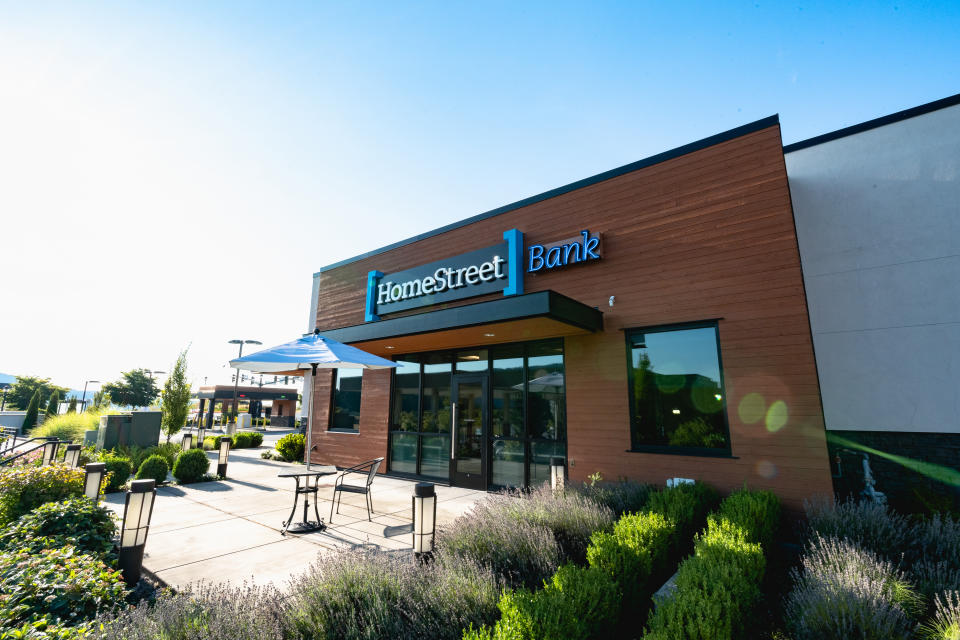HomeStreet to sell itself after tough year

Seattle-based HomeStreet, which saw its share price plunge last year amid concerns over rising interest rates and high levels of multifamily loans, agreed to sell itself Tuesday in an all-stock deal that recaptures some — though not all — of the market value the $9.5 billion-asset company lost.
Buyer FirstSun Capital Bancorp is paying $286 million, a sum that works out to $14.75 per HomeStreet share. That's just over half of HomeStreet's share price a year ago, but a noteworthy 37% premium over Friday's $10.77 closing price.
Solid fundamentals merited a serious offer, FirstSun CEO Neal Arnold said Tuesday on a conference call with analysts. "What we saw was a great deposit base where others had seen erosion given the uncertainty of the past year," Arnold said. "We saw a very conservative credit profile…We saw a very strong fee income profile and a very experienced management team.
"We were very excited to put together this opportunity," Arnold added.
Tuesday's deal, expected to close midway through 2024, pairs Homestreet's sizable, $4 billion multifamily portfolio with the $7.8 billion-asset FirstSun's growing commercial-and-industrial lending operation. The deal also provides access to the massive Southern California market, where HomeStreet operates 21 branches and FirstSun hopes to expand its business lending footprint.
"We've had success in recruiting and building a core commercial-and-industrial franchise in [existing] markets, so I'd expect there's plenty of opportunity to continue to do that," Arnold said. "Our focus is probably going to be building out Southern California — just the diversity economically of that market and its size."
As recently as 2021, HomeStreet ranked among the top-performing banks. Its $115.4 million net income produced a return on assets of 1.65% and return on equity of 15.36%, well above industrywide averages of 1.25% and 12.21%, according to the Federal Deposit Insurance Corp. But in 2022 and into 2023, as the Federal Reserve aggressively hiked interest rates to combat inflation, rapidly increasing funding costs outstripped a more modest pickup in loan yields, decimating HomeStreet's profitability. Profits fell to $66.5 million in 2022. Through the first nine months of 2023, HomeStreet reported a loss of $24.1 million, due largely to a $39.9 million goodwill impairment charge included in the company's second-quarter financial results.
One area of the balance sheet that has continued to perform reasonably well is deposits: HomeStreet's total of $6.7 billion on Sept. 30 was down 9% from year-end 2022, but given the upheaval that occurred following a series of high-profile bank failures in March and April, the company had been bracing for an even worse result, Chairman and CEO Mark Mason said on the conference call. "We had a certain amount of anxiety about how depositors would respond," Mason said. "They've really hung in there."
With the Federal Reserve poised to begin lowering rates, Mason said he expects HomeStreet's balance sheet to "start to heal itself" later this year. Now, though, the benefits will accrue to FirstSun. The merger is projected to result in a $17 billion company with 2025 earnings of $6.05 per share. Standalone FirstSun reported net income totaling $3.13 per share through Sept. 30 and $2.48 for all of 2022.
"We think this will be a top-tier, differentiated regional bank," Arnold said of the pro forma company's potential. "We won't just be a peer performer. We'll be a top-tier performer very quickly."
According to Mason, the deal "validates the intrinsic value of HomeStreet's loyal customer base, strong management and dynamic markets…and allows our shareholders to participate in the benefits of the combination going forward."
Timothy Coffey, who covers HomeStreet for Janney Montgomery Scott, acknowledged that declining interest rates would likely boost the company's profitability, but added that full recovery wouldn't come until 2025, and then only absent any economic deterioration. Coffey characterized the deal with FirstSun as a "best case scenario" in a research note Tuesday, adding that the combined company would earn more than HomeStreet could on its own.
Investors appeared to agree, as HomeStreet's stock was trading up more than 38% at $14.87 Tuesday afternoon. FirstSun shares were trading up nearly 5% at $35.30.
To help pay for the costs of the merger, including a $420 million mark-to-market writedown of HomeStreet's multifamily loans, FirstSun has agreed to sell $175 million in equity securities to a group of institutional investors including Wellington Management, which will invest $80 million in the merged company, and Castle Creek Capital, a private equity firm that focuses on bank investing, which pledged $30 million.
"FirstSun has built a strong reputation as a dependable, best-in-class community bank specializing in commercial services in key growth western markets," Tony Scavuzzo, managing principal at Castle Creek, said Tuesday in a press release. "We believe that FirstSun has the scale, platform and management team to become a leading regional bank under the leadership of Neal, and we are excited to help them execute on their M&A strategy."
FirstSun has no plans to conduct bulk sales of HomeStreet's multifamily portfolio. Indeed, Arnold cited multifamily as one of the top-performing asset classes from an asset quality perspective. "I'm a longtime believer because their credit profile is among the best in the industry," Arnold said.
Under terms of Tuesday's deal, HomeStreet would merge into Sunflower Bank, FirstSun's bank subsidiary, though the brand would be retained in the Pacific Northwest and Southern California. Arnold would continue as CEO, Mason would join the board and serve as executive vice chairman. FirstSun Executive Chairman Mollie Hale Carter would occupy the same position in the combined company.
